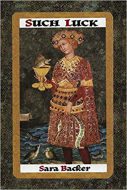 Sara Backer
Sara Backer
Such Luck
Flowstone Press
Reviewer: Ace Boggess
Sara Backer’s first full-length poetry collection Such Luck navigates familiar tones and themes but also conjures worlds that are intimate and personal to the poet, such that the reader often feels as if he has a voyeuristic view on the lives of the narrators. In these encounters, one finds a mix of beauty and discord, nostalgia and possibility. Many of the poems employ a narrative style, whereas others lean toward the confessional. All, however, achieve what the truly “greats” do: they begin with descriptions and images, then move subtly into meditations on the meanings of everyday acts.
In the poem “Wheels,” for example, Backer starts with vivid couplets depicting different types of wheels—helm, roulette, bicycle, bull’s-eye—then turns these pictures into a lesson about Fate:
That doesn’t mean
you’ll get both equally.
You can lose and lose and lose,
or always win.
Luck doesn’t keep a ledger;
it just swings.
In the title piece, which first appeared in Pedestal Magazine, she takes it a step further, stretching the scene into what could be a fairytale about a conversation with a fish, later segueing into the personal story of the narrator’s loneliness and longing, as well as her sense of inadvertent victory:
We talked till Fish’s gills began to dry.
I walked the length of the longest pier,
far from gulls and cormorants, tossed
and watched him flip four times
before he dove into dark waves.
I tossed my goblet after him,
thinking how lucky I was
to be unlucky in love.
While this is a short book, checking in at fifty-six pages, it includes fifty poems, many of which first appeared in such journals as Poetry Magazine, Tar River Poetry, Gargoyle, and Snapdragon: a Journal of Art & Healing. Backer manages to pack the pages full of thought-provoking depictions. She challenges the reader to go beyond immediate perceptions and see all sides of luck in life, as the narrator of “Chess Therapy” does:
I play both sides of the chess board,
alternating black and white. I fight and switch
becoming my own worst enemy
and then the enemy of my enemy.
I must watch closer. I’m not sure who wins …
She follows this piece with “Sixth Century Particle Theory,” her expansive view on the omnipresence of souls:
A droplet of cold rain had a soul,
and each flame of fire and each ash,
and the monsoon wind
blowing through centuries
into electrons and neutrinos humming
with innumerable splintering souls.
The poems in Such Luck demand multiple readings. One does not pass through these poems so much as encounter them on the road and stop for a shared cup of tea. They indicate a philosopher’s heart as much as a poet’s or a scholar’s. “Who was I before illness and injury? / Before I was warped by money and work?” the narrator asks in “My Focus Fails in Dyana,” then “Who was I before the overwhelming material / of existence? Before parents? Before language?” Though this poem shows yearning, struggle, and loss, Backer uses that to pluck at the strings of ontology, fretting interesting chords that muse on human nature and social construction. However, the reader never senses that Backer has thrown these concepts about without a specific purpose or asked for the meaning of life without already having a good idea where to find it. The poems come across as informed and sagely, but still driven by curiosity.
Backer’s book also includes poems that do not stare into the abyss. Plenty of humor can be found in the pages as well. One chuckles, for example, upon figuring out the subject of “Jack,” Backer’s piece that appeared in Poetry Magazine. It is a joke so well-told that one never sees the setup until the punchline hits.
Likewise, the reader finds a warmth of laughter in the childhood memories of a poem like “Which Way the Earth?”:
I needed to picture how planets moved.
My father replied: “That depends on where you are.”
His answer threw me
into a Milky Way of vantage points.
If Antarctica tops the planet, all continents point up.
Africa rotates from cashew into comfy chair.
The ice cream cone of South America becomes the wing
of a swan, the bosom of Australia a double-bottomed heart.
The National Geographic map cut Asia in half,
positioning where I lived in the center of the wall.
But the world was not flat, and I lost certainty
in what was left and what was right.
Childhood plays a large part in this collection. It is often the visceral imagery of childhood that sucks the reader in, before Backer ultimately moves in a meditative direction. The strongest example is “The Death Jar,” in which the narrator reflects on her childhood responsibility of killing beetles and how she turned that into a game before being chided for it. The poem offers a beautiful and disturbing snapshot while focusing on an experience that led to a valuable life lesson:
… but why
was it wrong to play with beetles and right to kill them?
…
… I loved roses, too.
I buried my nose in their pink and golden vortices, and kissed
their petals to feel softness on my lips, to ease the lesson
of summer: that I must destroy beauty to save beauty, while sensing,
in a child’s way, that I was more the beetle than the rose.
On whole, Such Luck is an outstanding book by a poet who uses a swift sleight of hand to toy with her readers’ expectations. As a poet, Backer seems driven by duty and love for the game that is language – the interplay makes for a book worth reading and rereading.

